« May 2005 | Main | July 2005 »
June 30, 2005
Your favorite taste or your favorite brand
NEURAL CORRELATES OF BEHAVIORAL PREFERENCE FOR CULTURALLY FAMILIAR DRINKS
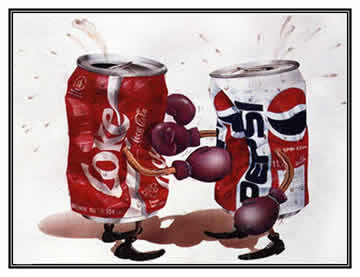
Are preferences for culturally familiar drinks such as Coke or Pepsi based solely on the taste or are there other factors involved? A recent article in Neuron discusses how cultural messages may be more influential than taste in the development of such preferences.
ABSTRACT
"Coca-Cola_ (Coke_) and Pepsi_ are nearly identical in chemical composition, yet humans routinely display strong subjective preferences for one or the other. This simple observation raises the important question of how cultural messages combine with content to shape our perceptions; even to the point of modifying behavioral preferences for a primary reward like a sugared drink. We delivered Coke and Pepsi to human subjects in behavioral taste tests and also in passive experiments carried out during functional magnetic resonance imaging (fMRI). Two conditions were examined: (1) anonymous delivery of Coke and Pepsi and (2) brand-cued delivery of Coke and Pepsi. For the anonymous task, we report a consistent neural response in the ventromedial prefrontal cortex that correlated with subjects’ behavioral preferences for these beverages. In the brand-cued experiment, brand knowledge for one of the drinks had a dramatic influence on expressed behavioral preferences and on the measured brain responses."
QUOTES
"Cultural influences on our behavioral preferences for food and drink are now intertwined with the biological expediency that shaped the early version of the underlying preference mechanisms. In many cases, cultural influences dominate what we eat and drink. Behavioral evidence suggests that cultural messages can insinuate them-selves into the decision-making processes that yield preferences for one consumable or another. Consequently, the appeal or repulsion of culturally relevant sights, sounds, and their associated memories all contribute to the modern construction of food and drink preferences."
"These two stimuli [Coke and Pepsi,] were chosen for three reasons. (1) They are culturally familiar to subjects. (2) They are both primarily composed of brown, carbonated sugar water, and sugar water serves as a primary reward in many animal and human experiments. (3) Despite their similarities, they generate a large subjective preference difference across human subjects, which might correlate with fMRI-measured brain responses. We pursued three primary questions using the experiments presented in this paper. (1) What is the behavioral and neural response to these drinks when presented anonymously? (2) What is the behavioral and neural influence of knowledge about which drink is being consumed? (3) In questions1 and 2, is there a correlation between the expressed behavioral preference and the neural response as measured using fMRI?"
"The medical importance of understanding these questions is straightforward—there is literally a growing crisis in obesity, type II diabetes, and all their sequelae that result directly from or are exacerbated by over consumption of calories (for recent work see Chacko et al., 2003; Ford et al., 2003; Wyatt, 2003; Zimmet, 2003; Popkin and Nielsen, 2003). It is now strongly suspected that one major culprit is sugared colas (Popkin and Nielsen, 2003)."
"Most real-world settings present numerous primary sensations and top-down influences that act to organize a coherent behavioral preference. Studies have indeed shown that cultural information can modulate reward-related brain response (Erk et al., 2002). 2002). This general observation is particularly true for Coke and Pepsi; that is, there are visual images and marketing messages that have insinuated themselves into the nervous systems of humans that consume the drinks. It is possible that these cultural messages perturb taste perception."
ABOUT THE FIRST AUTHOR
Samuel M. McClure
Samuel M. McClure is a psychology postdoctoral fellow at Princeton University. He received his PhD in neuroscience in 2003 from Baylor College of Medicine in Houston, Texas. "Broadly, my research lies in the area of reward processing. I am interested in how we respond to motivationally salient events, learn to predict them, and translate this knowledge into decisions to act. My work has focused on appetitive salient events, or rewards, and how they drive changes in neural activity in the basal ganglia and midbrain dopamine systems. These systems have long been associated with reward processing in the brain, but recently a new hypothesis has emerged which relates activity in these systems to artificial intelligence learning algorithms. The theory states that the dopamine systems calculate error in the prediction of reward that is then propagated as learning signals to the basal ganglia. Further, the basal ganglia are believed to use these signals to improve our decision making in the future." –from Samuel M. McClure’s homepage
Jian Li
Jian Li is a PhD candidate at Baylor College of Medicine in Houston, Texas. He received his B.S. from Nanjing University in Nanjing, China. – from Jian Li's curriculum vitae
Damon Tomlin
Damon Tomlin is a graduate student in the neuroscience department at Baylor College of Medicine in Houston, Texas. He received his bachelor's degree in biomedical engineering in 2001 from Vanderbilt University in Nashville, Tennessee. –from the Baylor College of Medicine researcher profile
Kim S. Cypert & Latane M. Montague
Kim S. Cypert & Latane M. Montague are two people we can find little about, but we do know that Latane is Read's daughter.
Read Montague
Dr. Read Montague is a Professor in the Division of Neuroscience at Baylor College of Medicine, Director of the Human Neuroimaging Lab, and Director of the Center for Theoretical Neuroscience. His work focuses on computational neuroscience - the connection between the physical mechanisms present in real neural tissue and the computational functions that these mechanisms embody. -from the Baylor College of Medicine Human Neuroimaging Lab
Posted by DSN at 11:50 PM | Comments (0) | TrackBack
June 27, 2005
Society for Medical Decision Making
27TH SOCIETY FOR MEDICAL DECISION MAKING ANNUAL MEETING

We are pleased to invite you to submit an abstract and attend the 27th Annual Meeting of the Society for Medical Decision Making (SMDM).
This year’s meeting will take place from October 21-24, 2005 in San Francisco, CA. The meeting hotel is the Hyatt Regency San Francisco.
The theme of the 2005 meeting will be Translating Medical Decision Making Research into Practice. We plan to highlight the ways in which decision science - ranging from decision analysis, clinical decision aids, cost-effectiveness analysis, and clinical modeling - is translated into clinical care and health system operations. We encourage submission of abstracts in all relevant areas, with a particular emphasis on this year’s theme of translating knowledge into practice. As we will have an overlapping session with the International Society for Quality of Life Research (ISOQOL) , we are also interested in abstracts of interest to members of both societies. Reviewers representing a range of disciplines, who are blind to authorship, will select abstracts for all oral and poster presentations.
This year’s meeting is different in several exciting ways - first, ISOQOL will be having their annual meeting immediately preceding the SMDM meeting also at the Hyatt. We hope many of our members decide to come a day or two early and participate in the ISOQOL meeting - and are looking forward to having some ISOQOL members stay a little longer to see what SMDM is all about! In addition, on Saturday October 22nd our opening session will be a joint session with the ISOQOL attendees. We plan to highlight abstracts from both societies which explore the scientific overlap of SMDM and ISOQOL and will end the session with a joint poster session and reception.
Second, because this year our meeting is on the west coast, and given our overlap with the ISOQOL meeting, we will be starting the short courses on Friday afternoon (allowing our east coast members time to fly in that morning) and ending with a full day on Monday the 24th. Our short courses will therefore be on the afternoon of Friday October 21st and Saturday morning the 22nd. As usual, the short courses will address the methodologies and applications that span the broad spectrum of interests reflected in the Society. New courses offered this year include: Changing Physician Behavior, and Presenting Cost Effectiveness Results for Non Economists, as well as a special course by ISOQOL member John E. Ware PhD on Dynamic Health Assessments.
This year’s meeting will feature two special symposia: one focusing on priorities in patient decision making research, and the other looking at how to effectively communicate our research to our consumers. The Sunday symposium is entitled Translating Research into Practice: Setting a Research Agenda for Clinical Decision Tools in Cancer Prevention, Early Detection, and Treatment and will feature Ellen Peters PhD of the University of Oregon, E Dale Collins MD, MSc and Hilary Llewellyn-Thomas, PhD from Dartmouth-Hitchcock Medical Center, and Laura Siminoff PhD of Case Western Reserve University. The Monday symposium is entitled The Risky Business of Communicating Risk and will focus on effective ways of communicating methodologically and socially difficult material to the public, patients, physicians, and policy makers. This symposium will feature Howard Spielman, MBA, PhD of Management Semiotics International Inc, Steve Denning, LL.B, B.C.L. previously of the World Bank, and Baruch Fischhoff, PhD of Carnegie Mellon University.
For our social event we will be spending Sunday evening at the Bubble Lounge - a lovely establishment whose high ceilings, dark wood, and many areas of comfy couches and low tables will be the ideal back drop for great food and lively conversation. In addition, the program committee has put together a website full of information about San Francisco and things for you to do while you’re visiting. We hope that it will help you plan your trip to this lovely city.
Again, this year’s SMDM abstract submission process will be fully electronic. Complete instructions and the online form can be accessed on the SMDM website here. The deadline for receipt of abstracts is 11:59 midnight PST on June 10, 2005. Full text of accepted abstracts will appear in the November-December issue of our bi-monthly journal Medical Decision Making. In a subsequent mailing, you will receive an Annual Meeting overview, short course description, hotel and travel information about San Francisco and our social event, and a meeting registration form. The 27th SMDM Annual Meeting will provide a great opportunity to hear about cutting-edge research across a spectrum of disciplines with good friends in a friendly and supportive atmosphere.
We look forward to your submissions, and we’ll see you in San Francisco!
Sincerely,
Gillian D Sanders, PhD and Dena M. Bravata, MD, MS
2005 Program Co-Chairs
Posted by DSN at 04:47 PM | Comments (0) | TrackBack
June 22, 2005
Faculty Marketing Positions Available
FACULTY MARKETING POSITIONS ARE AVAILABLE AT DUKE UNIVERSITY, THE UNIVERSITY OF SOUTH CAROLINA AND THE UNIVERSITY OF IOWA

1.
DUKE UNIVERSITY - THE FUQUA SCHOOL OF BUSINESS - Durham, North Carolina
Duke University has openings for marketing faculty at all ranks in the Fuqua School of Business beginning fall 2006. Emphasis will be placed on an individual's actual or potential for research excellence and impact. The Fuqua School of Business is a top-ranked, highly innovative, global business school; Duke University is regarded as one of the nation's finest. The Raleigh-Durham-Chapel Hill area has been highly rated as a living environment. The presence of several major universities and the Research Triangle Park helps to provide an outstanding combination of exceptional lifestyle, vibrant business community, and an extensive set of cultural, academic, and leisure opportunities.
Send resume to:
Professor Wagner A. Kamakura
The Fuqua School of Business
Duke University
Box 90120
Durham, NC 27708-0120
Tel (919) 660-7855
Fax (919) 681-6245
Duke University is an equal opportunity/affirmative action employer.
2.
THE UNIVERSITY OF SOUTH CAROLINA - THE MOORE SCHOOL OF BUSINESS - Columbia, South Carolina
The Moore School of Business at The University of South Carolina invites applications for tenure-track positions in Marketing at the rank of new assistant professor, advanced assistant professor, or associate professor beginning August 2006. Eligible candidates must have a Ph.D. in marketing or related field by the date of appointment. Preferred candidates for the new assistant professor position(s) will evidence sophisticated research capability in a well-defined area of marketing leading to sustained publications in top journals and potential for high-quality instruction at undergraduate, MBA, and Ph.D. levels. Preferred candidates for the advanced assistant and associate professor position(s) must have established records of publications in the top marketing journals along with evidence of high-quality teaching and capability of immediately teaching MBA courses. We are seeking applicants with areas of specialization in consumer behavior, marketing strategy, and marketing modeling.
Please send applications to:
Professor Terence A. Shimp, Chair, The Moore School of Business, University of South Carolina
Columbia, SC 29208
Representatives from the Marketing Department will conduct interviews at the forthcoming AMA Summer Educators’ Conference in San Francisco, July 28 – August 1, 2005. Women and minorities are encouraged to apply. The University of South Carolina is an Equal Opportunity/Affirmative Action employer. For more information about the Moore School of Business and the marketing faculty, please visit our web site at http://mooreschool.sc.edu.
3.
THE UNIVERSITY OF IOWA - Iowa City, Iowa
The University of Iowa invites the submission of resumes from qualified candidates for one or more anticipated faculty positions in marketing at the rank of lecturer, regular or visiting; assistant, associate or full professor, either tenure-track or visiting. We are particularly seeking individuals with research interests in marketing models or marketing strategy, but will consider all areas in marketing.
Assistant-level candidates should have a completed or nearly completed dissertation and clearly exhibit high potential for scholarly research and effective teaching. Candidates with an established record of excellence in published scholarly research and quality teaching will be considered for positions at the rank of associate or full professor.
Iowa City, which hosts the University, is a desirable place to live. The schools, medical services, quality of the community and reasonable real estate values combine to provide substantial benefits for faculty members. The University is a state-supported school of about 27,000 students. Of those, over 15,000 are enrolled in the College of Liberal Arts. This gives the campus and campus life a distinct cultural flavor which makes the environment quite stimulating.
Send curriculum vitae to:
Professor Cathy Cole, Chair, Department of Marketing
Tippie College of Business, University of Iowa
108 Pappajohn Business Bldg.
Iowa City, IA 52242-1000
or via e-mail
business-college-marketing@uiowa.edu.
When submitting resumes, please specify whether application is for tenure-track, visiting or lecturer position. The University of Iowa is an Affirmative Action/ Equal Opportunity Employer. Women, minorities, and persons with disabilities are enthusiastically encouraged to apply.
Posted by DSN at 10:53 PM | Comments (0) | TrackBack
June 20, 2005
Brunswik Society
THE TWENTY FIRST ANNUAL MEETING OF THE BRUNSWIK SOCIETY

The Twenty-first Annual Meeting of the Brunswik Society will be held in Toronto, Ontario, Canada on November 10-11, 2005. This years conference will be held at the Sheraton Centre Hotel.
Call for Papers and Participation:
The 21st Annual International Meeting of the Brunswik Society will be held on Thursday and Friday, November 10-11, 2005 Sheraton Centre Hotel in Toronto, Ontario, Canada. The program begins at 1:00 on Thursday afternoon, and ends at 5:30 on Friday. We invite proposals for papers on your recent research and panel discussions on any theoretical or empirical/applied topic related to Egon Brunswik's philosophy and paradigm. Please send a brief abstract (50 words), and indicate whether the paper/discussion is theoretical or empirical, to Jim Holzworth by Friday, July 17th. Kindly respect this submission due date. The organizing committee is: Jim Holzworth (holz@uconn.edu), Mandeep K. Dhami (mkdhami@uvic.ca), Elise Weaver (eweaver@WPI.EDU), and Tom Stewart (t.stewart@albany.edu).
The meeting is held concurrently with the Psychonomic Society Annual Meeting and just before the Judgment and Decision Society meeting. As planning for the meeting progresses, information and updates will be posted here and on the Brunswik email list. Registration (Deadline November 1, 2005): Please register in advance so we can estimate attendance. You may register online or by email (info@brunswik.org), telephone (518-442-3850), or fax (518-442-3398). The registration fee, due November 1, is $100 US or $125 Canadian. Students may register for $40 US or $50 Canadian. The fee includes the continental breakfast and lunch on Friday.
Checks should be payable to "Brunswik Society" and sent to:
The Brunswik Society
c/o Tom Stewart
Center for Policy Research
135 Western Ave. Milne 300
Albany, NY 12222
Accommodations:
The meeting will be held at the Sheraton Centre Toronto
123 Queen Street West, Toronto, Canada
Phone (416) 361-1000
Fax (416) 947-4854
If you call for a reservation, say you are with the Psychonomic Society. Arrangements for the Brunswik Society meeting are made through the Psychonomic Society.
Posted by DSN at 05:38 PM | Comments (0) | TrackBack
June 13, 2005
Anybody got any sarcasm?
THE NEUROANATOMICAL BASIS OF UNDERSTANDING SARCASM AND ITS RELATIONSHIP TO SOCIAL COGNITION:
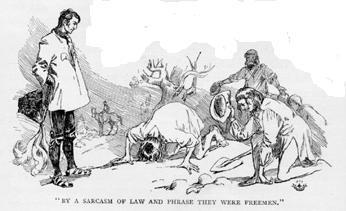
Detecting sarcasm relies upon the ability to monitor other peoples' mental states, thoughts and feelings. Detecting sarcasm then is necessary for effective decision making and social cognition. A recent article in Neuropsychology offers findings regarding the neurobiology of comprehension of sarcasm and the cognitive processes underlying it.
ABSRTACT:
"The authors explored the neurobiology of sarcasm and the cognitive processes underlying it by examining the performance of participants with focal lesions on tasks that required understanding of sarcasm and social cognition. Participants with prefrontal damage (n 25) showed impaired performance on the sarcasm task, whereas participants with posterior damage (n 16) and healthy controls (n 17) performed the same task without difficulty. Within the prefrontal group, right ventromedial lesions were associated with the most profound deficit in comprehending sarcasm. In addition, although the prefrontal damage was associated with deficits in theory of mind and right hemisphere damage was associated with deficits in identifying emotions, these 2 abilities were related to the ability to understand sarcasm. This suggests that the right frontal lobe mediates understanding of sarcasm by integrating affective processing with perspective taking."
QUOTES:
"Irony is an indirect form of speech used to convey feelings in an indirect way. Ironic utterances are characterized by opposition between the literal meaning of the sentence and the speaker’s meaning (Winner, 1988). One form of irony is sarcasm. Sarcasm is usually used to communicate implicit criticism about the listener or the situation. It is usually used in situations provoking negative affect and is accompanied by disapproval, contempt, and scorn (Sperber & Wilson, 1986). For example, a boss catching his employee taking a nap may remark “Joe, don’t work too hard!” to express his disapproval. The listener must identify the opposition between the literal meaning of this sentence (Joe is working too hard) and the boss’s intention to criticize Joe (Joe is a lazy worker). The ironic speaker intends that the listener detect the deliberate falseness; he makes a statement that violates the context and intends the listener to recognize this statement (Dennis, Purvis, Barnes, Wilkinson, & Winner, 2001). The interpretation of sarcasm thus involves understanding of the intentions expressed in the situation and may include processes of social cognition and theory of mind."
"It appears that a deficit in understanding sarcastic utterances may reflect an impaired ability to understand social cues such as intentions, beliefs, and emotions. In concordance, recent theories explaining irony have argued that sarcastic comments are interpreted in the light of their relevance to the situation. Sperber and Wilson’s (1981) relevance theory advocates that the interpretation of ironic utterances may require recognition of the speaker’s attitude and thus requires shared knowledge between the speaker and the listener."
"Although the right hemisphere is clearly implicated in detection of irony and sarcasm, there are indications that the frontal lobes may also be involved in interpretation of sarcastic utterances. The frontal lobes have long been considered to play a special role in social cognition, with damage in this region affecting not only high-level cognitive functions but also social behavior (Adolphs, 1999; Eslinger, 1998) and personality (A. R. Damasio, 1994). Alexander, Benson, and Stuss (1989) suggested that damage to the frontal lobes area may impair analysis, planning, and monitoring of language."
"The social communicative function of irony suggests a distinct role for ventromedial (VM) regions within the frontal lobes, as opposed to dorsolateral (DL) regions. Whereas DL prefrontal regions have been associated with executive functions, VM lesions have been shown to result in impaired social skills, such as social judgment (Eslinger & Damasio, 1985) and decision making (Bechara, Damasio, Tranel, & Anderson, 1998). Thus, if patients with lesions in sub-regions of the prefrontal cortex differ in their deficit in understanding sarcasm, this would suggest that specific areas within the prefrontal cortex are crucial to the mediation of comprehension of sarcastic utterances."
"Given the emotional and social communicative function of sarcastic utterances, it is only to be expected that its interpretation would be mediated by brain areas specialized in affective processing and social cognition. As noted above, the right frontal lobe has been implicated in nonliteral language functions (Alexander et al., 1989), humor appreciation (Shammi & Stuss, 1999), and self-awareness (Stuss & Benson, 1986). It has been previously suggested that the right and the left hemispheres have separate contributions to communication, the left hemisphere’s role being propositional and symbolic and the right hemisphere’s role being emotional (Bloom, Borod, Obler, & Gerstman, 1993; Buck, 1995)."
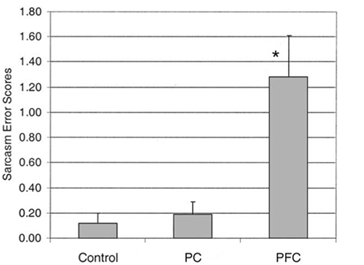
"Mean sarcasm error scores (error bars represent standard error) in patients with posterior (PC) and prefrontal (PFC) lesions and in healthy controls. Post hoc analysis: PFC was significantly different from healthy controls and PC (*p<.05)."
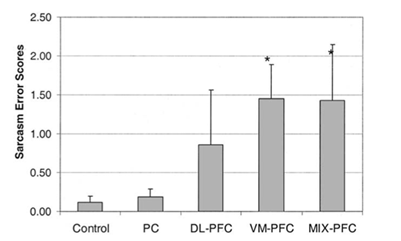
"Mean sarcasm error scores (error bars represent standard error) in patients with lesions limited to subregions of the prefrontal cortex (PFC), compared with posterior cortex (PC) lesion patients and healthy controls (*p<.05). VM=ventromedial PFC; DL=dorsolateral PFC; MIX=mixed DL and VM lesions."
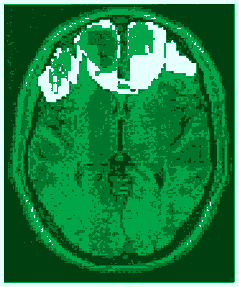
"Lesions associated with impaired ability to interpret sarcasm. Reconstruction of the prefrontal cortex lesions in 13 patients with the most impaired sarcasm scores. Superimposition of lesions indicated that in this group, the lesion in the right ventromedial area was significantly larger than the lesions in either the left ventromedial or right dorsolateral regions (but not significantly different from the left dorsolateral). Note that in the picture, as in imaging scans, left is right."
"The present study offers findings regarding the neurobiology of comprehension of sarcasm and the cognitive processes underlying it. First, in the task that assesses understanding of sarcastic utterances, participants with prefrontal damage showed impaired performance, whereas participants with posterior damage and HCs showed a preserved performance. Within the frontal lobe group, right prefrontal damage, and particularly damage incorporating the right VM region, was associated with the most profound deficit in understanding sarcasm. Second, although prefrontal damage was associated with deficits in ToM and right hemisphere damage was associated with deficits in the ability to identify emotions, both abilities were related to the ability to understand sarcastic utterances."
ABOUT THE AUTHORS:
S. G. Shamay-Tsoory is Faculty at the University of Haifa, Israel. Her research interests include: Neural correlates of emotions and social cognition, particularly empathy and "theory of mind", the behavioral and emotional consequences of brain injury, developmental neuropsychology and the neuropsychological basis of autism - from departmental page.
Rachel Tomer is Senior lecturer in the department of psychology and head of the Clinical Neuropsychology Program at Haifa University, Israel. "My major interest is the behavioural correlates of normal and pathological asymmetries in the brain. My focus is on the subcortical-prefrontal circuits, which are affected in a number of neuropsychiatric syndromes, and more specifically on the role of asymmetries (functional as well as structural) in these pathologies. Current studies involve cognitive and affective changes in Parkinson’s disease, Obsessive-Compulsive Disease and acquired brain damage, and how these are related to abnormal patterns of asymmetry in the brain." - from Tomer's Homepage.
Judith Aharon-Peretz is Faculty Cognitive Neurology Unit, Rambam Medical Center, Israel. Her research interests include: Cognitive flexibility in Parkinson’s disease: the contribution of clinical characteristics to impairment in spontaneous vs. Reactive flexibility. Aharon-Peretz page at The Technion-Israel Institute of technology.
Posted by DSN at 10:34 PM | Comments (0) | TrackBack
June 09, 2005
Sad news
PROFESSOR DICK WITTINK

Dick Wittink, one of the world's leading professors of business, member of the Royal Dutch Academy of Sciences, advisor to many, and Editor of the Journal of Marketing Research has died Tuesday at age 59, as reported in the New Haven Register. I was in regular contact with Dick over the past months and am stunned to learn of this tragedy.
As an academic, Dick was rare in exhibiting expertise in multiple areas including quantitative analysis, the economics of marketing, and consumer behavior. He cared about using knowledge about decision making to improve health care. Some accomplishments are detailed on his page at Yale, where he was George Rogers Clark Professor of Management and Marketing.
We extend our condolences.
Posted by dggoldst at 09:54 AM | Comments (0) | TrackBack